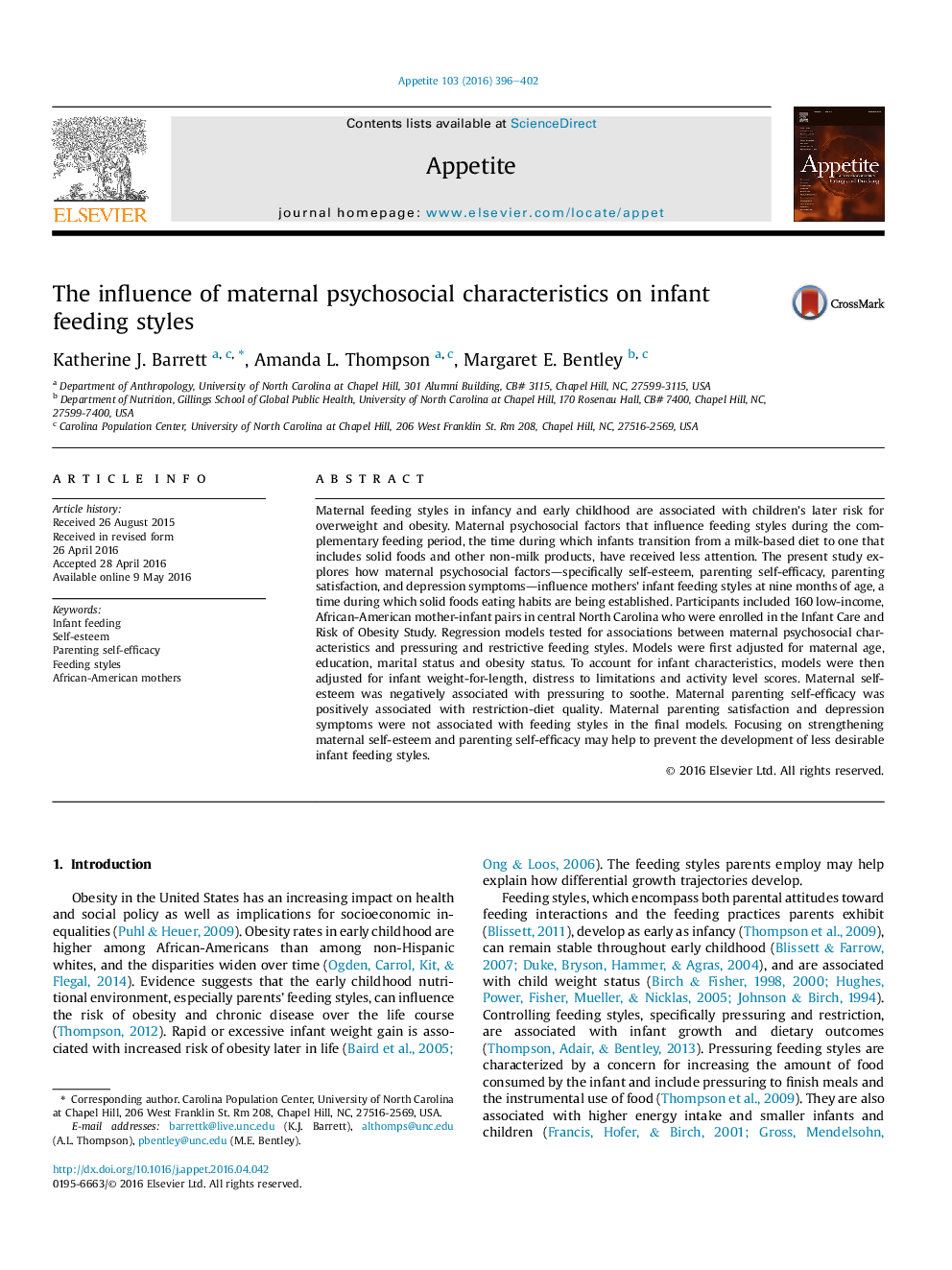| کد مقاله | کد نشریه | سال انتشار | مقاله انگلیسی | نسخه تمام متن |
|---|---|---|---|---|
| 7307564 | 1475377 | 2016 | 7 صفحه PDF | دانلود رایگان |
عنوان انگلیسی مقاله ISI
The influence of maternal psychosocial characteristics on infant feeding styles
ترجمه فارسی عنوان
تاثیر ویژگی های روان شناختی مادران بر سبک تغذیه نوزادان
دانلود مقاله + سفارش ترجمه
دانلود مقاله ISI انگلیسی
رایگان برای ایرانیان
کلمات کلیدی
تغذیه نوزادان، اعتماد به نفس، خودکارآمدی والدین، سبک تغذیه، مادران آفریقایی-آمریکایی،
ترجمه چکیده
سبک تغذیه مادران در دوران کودکی و دوران کودکی با احتمال خطر ابتلا به اضافه وزن و چاقی همراه است. عوامل روانشناختی مادران که در طول دوره تغذیه تکمیلی، زمانی که نوزادان از یک رژیم غذایی شیری به یک غذای جامد و سایر کالاهای غیر شیری انتقال می یابند، کمتر توجه می کنند. این مطالعه به بررسی اینکه چگونه عوامل خانوادگی روانشناختی، مخصوصا عزت نفس، خودآموزی والدین، رضایت والدین و نشانه های افسردگی، تاثیر می گذارد، سبب تغییر سبک تغذیه نوزادان مادر در 9 ماهگی می شود. شرکت کنندگان 160 زن و شوهر کم سن، آفریقایی آمریکایی را در مرکز کارولینای شمالی مستقر کردند که در مراقبت های نوزادان و خطر ابتلا به چاقی ثبت نام کردند. مدل های رگرسیون برای ارتباط بین خصوصیات روانی-اجتماعی مادران و سبک های تغذیه ای محدود و محدود مورد آزمایش قرار گرفتند. ابتدا مدل ها برای سن مادر، تحصیلات، وضعیت زناشویی و وضعیت چاقی تنظیم شد. برای تشخیص ویژگی های نوزاد، مدل ها برای وزن نوزادان به مدت طول، رنج به محدودیت ها و نمرات سطح فعالیت تنظیم شد. اعتماد به نفس مادر با فشار دادن برای تسکین منفی منفی بود. خودکارآمدی پدر و مادر مادر با کیفیت غذایی رژیم غذایی رابطه مثبت دارد. رضایت والدین مادر و علائم افسردگی با سبک تغذیه در مدل های نهایی ارتباطی نداشتند. تمرکز بر تقویت عزت نفس مادر و خود کارآمدی والدین ممکن است به جلوگیری از توسعه سبک های تغذیه ای کمتر کودک مطلوب کمک کند.
موضوعات مرتبط
علوم زیستی و بیوفناوری
علوم کشاورزی و بیولوژیک
دانش تغذیه
چکیده انگلیسی
Maternal feeding styles in infancy and early childhood are associated with children's later risk for overweight and obesity. Maternal psychosocial factors that influence feeding styles during the complementary feeding period, the time during which infants transition from a milk-based diet to one that includes solid foods and other non-milk products, have received less attention. The present study explores how maternal psychosocial factors-specifically self-esteem, parenting self-efficacy, parenting satisfaction, and depression symptoms-influence mothers' infant feeding styles at nine months of age, a time during which solid foods eating habits are being established. Participants included 160 low-income, African-American mother-infant pairs in central North Carolina who were enrolled in the Infant Care and Risk of Obesity Study. Regression models tested for associations between maternal psychosocial characteristics and pressuring and restrictive feeding styles. Models were first adjusted for maternal age, education, marital status and obesity status. To account for infant characteristics, models were then adjusted for infant weight-for-length, distress to limitations and activity level scores. Maternal self-esteem was negatively associated with pressuring to soothe. Maternal parenting self-efficacy was positively associated with restriction-diet quality. Maternal parenting satisfaction and depression symptoms were not associated with feeding styles in the final models. Focusing on strengthening maternal self-esteem and parenting self-efficacy may help to prevent the development of less desirable infant feeding styles.
ناشر
Database: Elsevier - ScienceDirect (ساینس دایرکت)
Journal: Appetite - Volume 103, 1 August 2016, Pages 396-402
Journal: Appetite - Volume 103, 1 August 2016, Pages 396-402
نویسندگان
Katherine J. Barrett, Amanda L. Thompson, Margaret E. Bentley,
